It’s always a special feeling when your partner goes out of their way to make you feel appreciated. Maybe they surprise you with your favorite coffee or treat you to something you’ve been eyeing for months. These thoughtful gestures can really warm the heart. But let’s be honest, when expectations don’t align, even small moments can stir up some unexpected tension in a relationship.
Take, for example, a story where a woman shared how a casual dinner with her boyfriend suddenly went sideways. Mid-meal, he not only expected her to pay for their food but also asked her to send him extra cash for drinks with his friends afterward. As if that wasn’t awkward enough, his friends egged him on while she calmly said no. Keep reading to see how the internet responded and decide for yourself who crossed the line.
RELATED:
Spoiling your partner is a thoughtful gesture, not something that should ever be expected or demanded

Image credits: freepik (not the actual photo)
A woman shared her story about refusing to pay for her boyfriend’s “bro night” after he unexpectedly put her on the spot
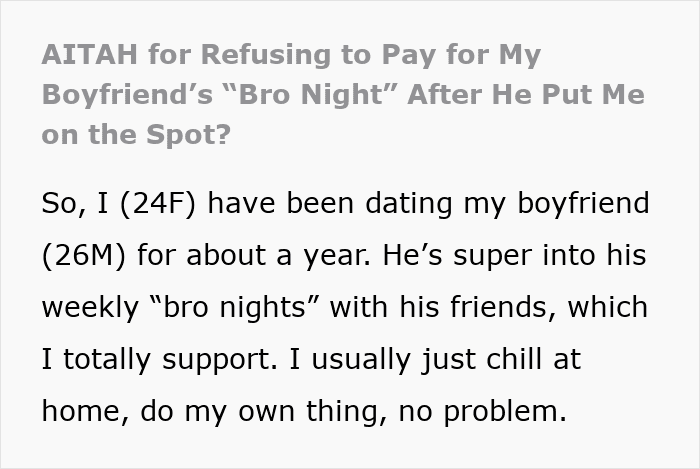
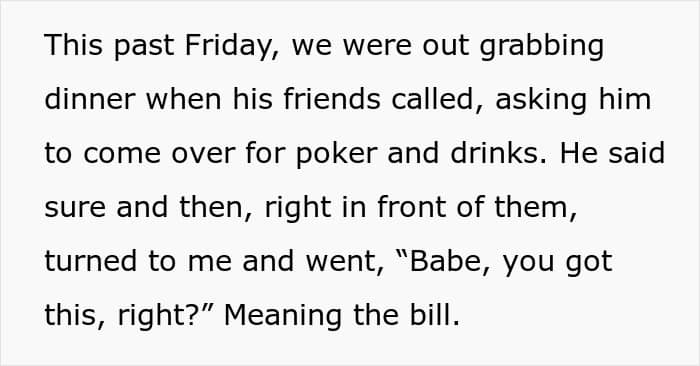
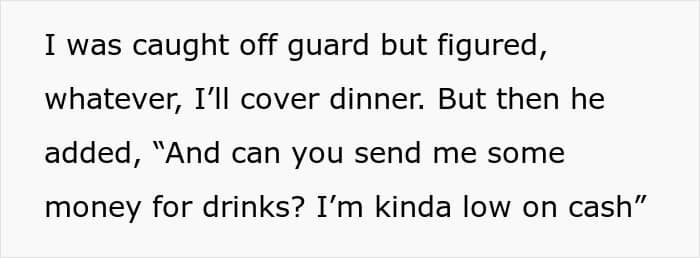
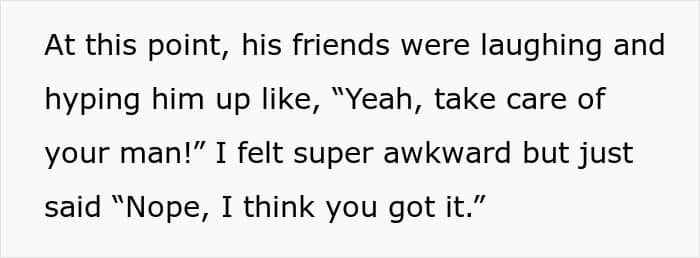

Image credits: freepik (not the actual photo)
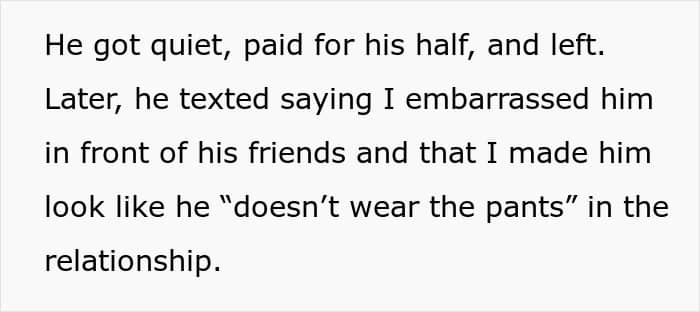
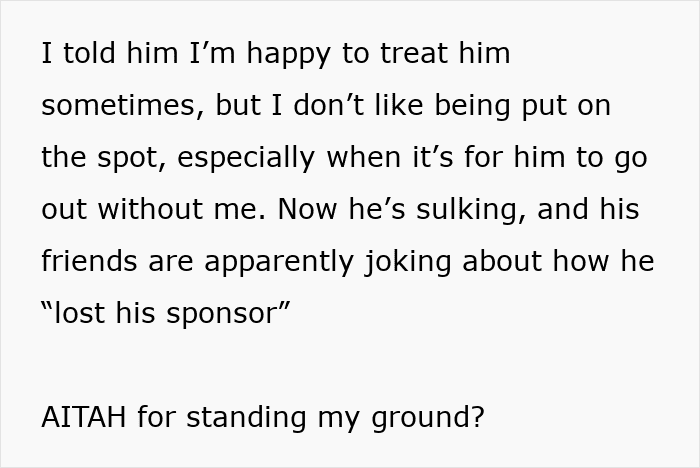
Image credits: Crazy-Dependent-1327
Peer pressure isn’t just limited to teenagers; adults often experience it too, especially in social situations

We all have those days when friends can lift us up like no one else. They’re the ones planning surprise dances at your wedding or sneaking in your favorite dessert when you’re feeling low. They remind you to save money, push you to go after your dreams, and call you out when you’re being too hard on yourself. Good friends can seriously make any situation 100 times better. Their presence alone can be comforting when everything feels chaotic. But not every group of friends has your best interests at heart.
On the flip side, there’s something called negative peer pressure that quietly creeps in. You’re not in the mood to drink or smoke, but your friends won’t stop nudging you to “live a little.” They may joke about your spending habits or guilt-trip you for skipping the party. You might start feeling torn between your own instincts and what the group expects. And that’s when problems begin to pile up.
Philip J. Lanzisera, Ph.D., a psychologist at Henry Ford Health, sheds light on this in a powerful way. He says, “Just like kids, adults might be pressured to have a drink, engage in an unhealthy behavior, or purchase a product they don’t need.” Peer pressure doesn’t disappear with age; it just puts on a different outfit. One that sometimes looks like friends who are just “joking.”
Philip adds, “The issue is the same: Is this person giving me permission to do something I want to do that conflicts with my goals and values?” Often, we say yes out of impulse or discomfort without really thinking about the bigger picture. But stepping back helps you realize whether it’s truly your decision or someone else’s idea of fun.
This approach reminds us of something important: you always have a choice. You don’t need to follow along just because everyone else is doing something. Drawing boundaries as adults is not just healthy, it’s necessary. And when someone questions those boundaries, dig deeper. If a friend urges you to drink, ask them why they drink, how it benefits them, and whether they’d respect you if you declined. Sometimes, questions are more powerful than statements.
Start by being a better friend to yourself. Understand your values and remind yourself that it’s okay to say “No.” Not just a polite “maybe later,” but a clear and confident no. The more certain you are, the less room there is for others to push. It’s not about being rude; it’s about being firm about what feels right for you. And remember, you don’t need to justify every decision. Your boundaries are valid, even if no one else agrees.
It’s important to surround yourself with people who genuinely uplift and support you, not those who take advantage of you

That said, backing up a no with something positive can help ease the tension. Say something like, “I’m skipping drinks tonight, but I’d love to grab a bite instead.” This keeps the tone friendly while standing your ground. It also gently reminds people that relationships shouldn’t hinge on your ability to say yes. It opens the door to connection without the pressure. And it’s a way of shifting the mood without feeling confrontational.
Choose to spend your time with people who genuinely lift you up. The ones who cheer for you, whether you’re sipping water or passing on the weekend plans. They understand that friendship isn’t about constantly agreeing, it’s about showing up with respect. When your circle supports your decisions, peer pressure fades into the background. You feel safe being yourself without having to prove anything. That’s the kind of crew that fuels growth, not guilt.
Of course, it’s okay to step out of your comfort zone every now and then. Joining a party when you’re not quite in the mood can sometimes turn into a fun night. But feeling forced into doing things regularly, just to maintain peace or avoid judgment? That’s a red flag. It’s one thing to compromise occasionally, and another to constantly shrink yourself to fit in. A healthy relationship, romantic or otherwise, shouldn’t come at the cost of your values. What are your thoughts on this? Have you ever found yourself changing too much for someone else? How would you react if you realized you were giving up pieces of yourself just to keep the peace?
Many people online felt the woman’s actions were justified and agreed that her boyfriend was in the wrong











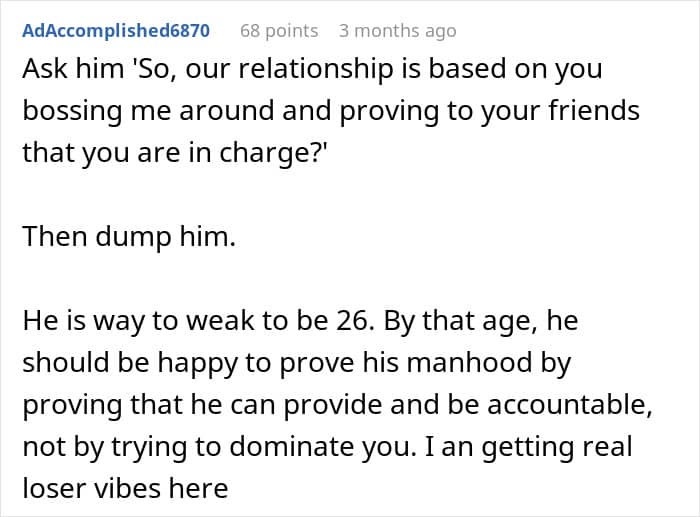


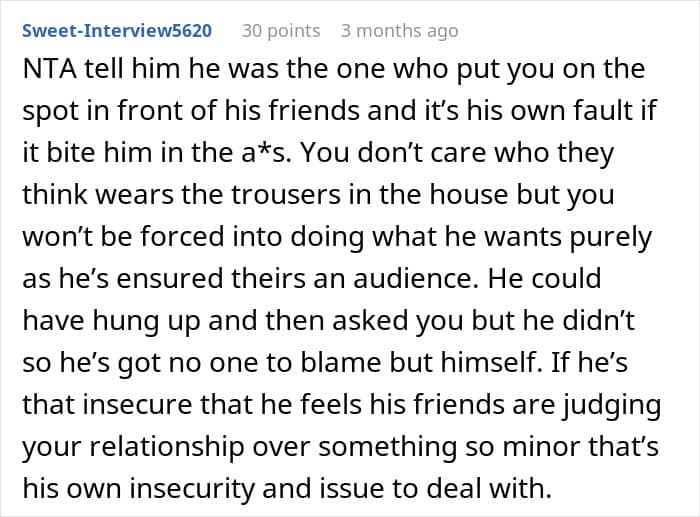
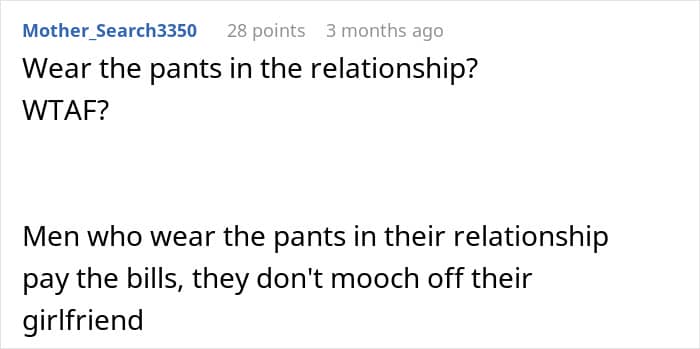


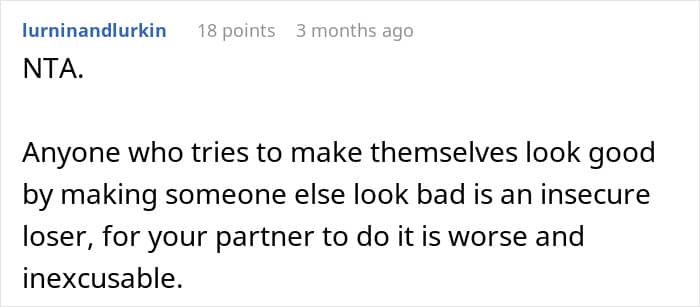
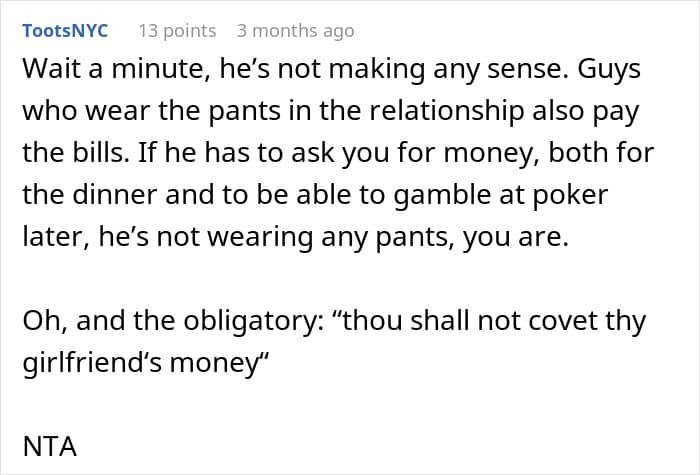




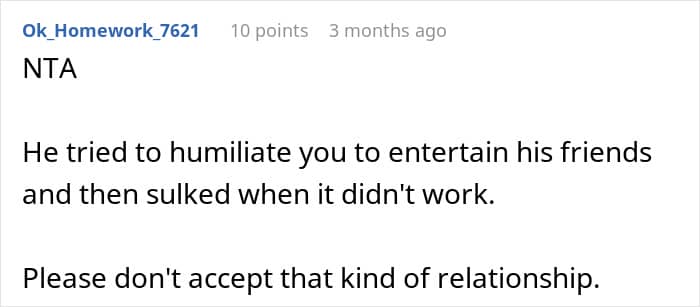


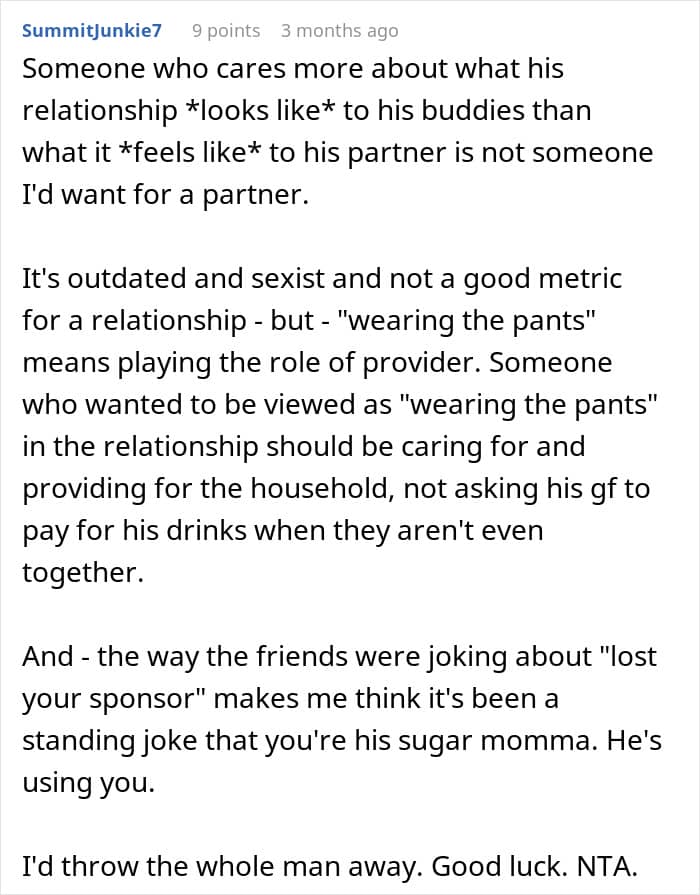
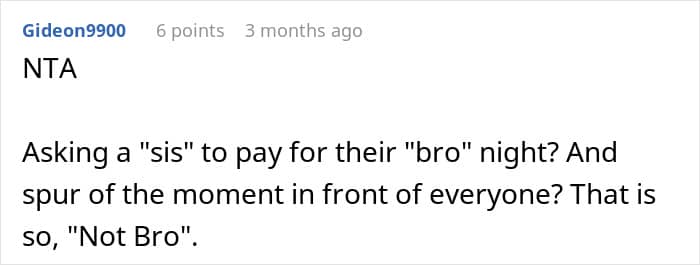
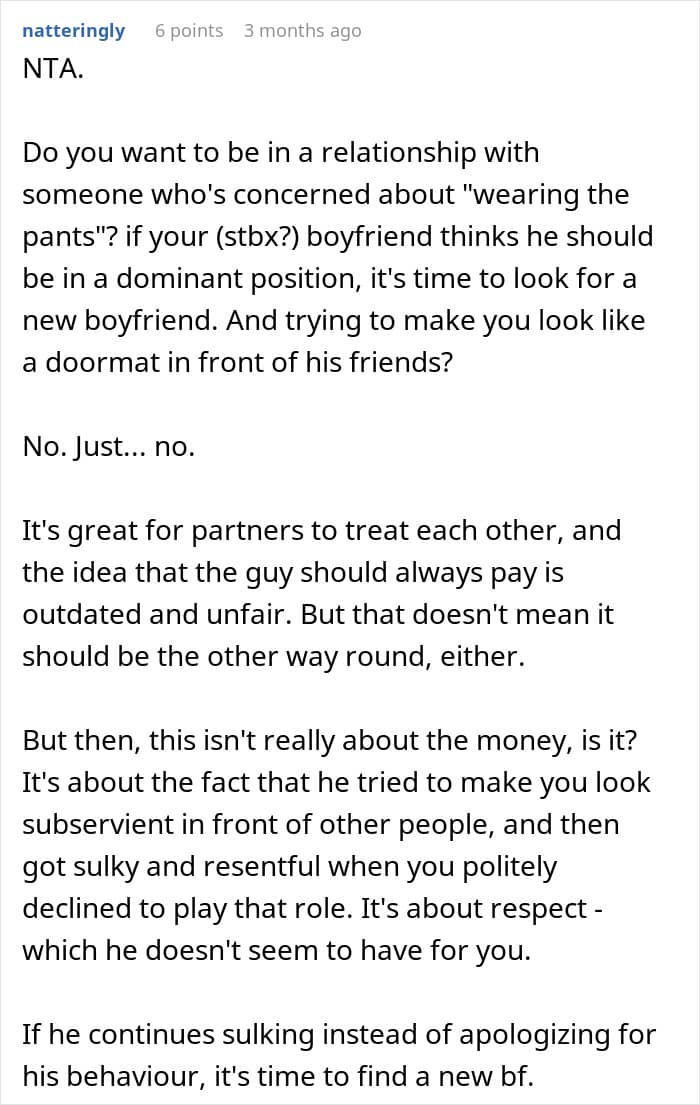
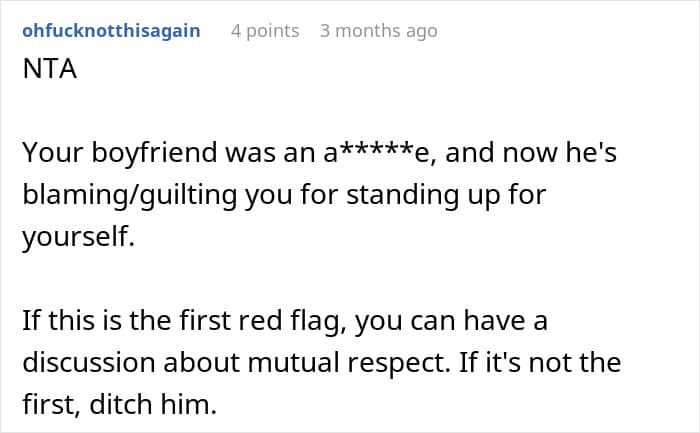


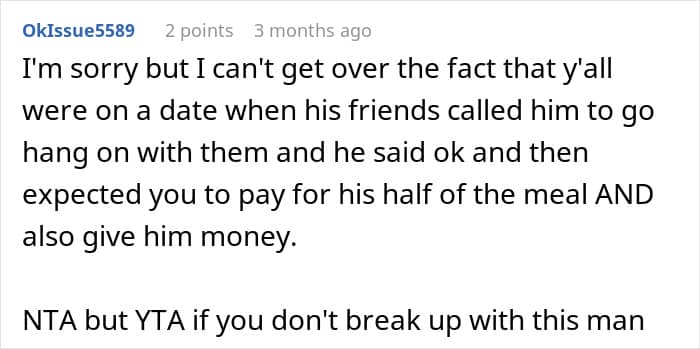

Some readers felt the author should have paid for her boyfriend


The author later shared an update on their relationship status following the incident

Image credits: Crazy-Dependent-1327